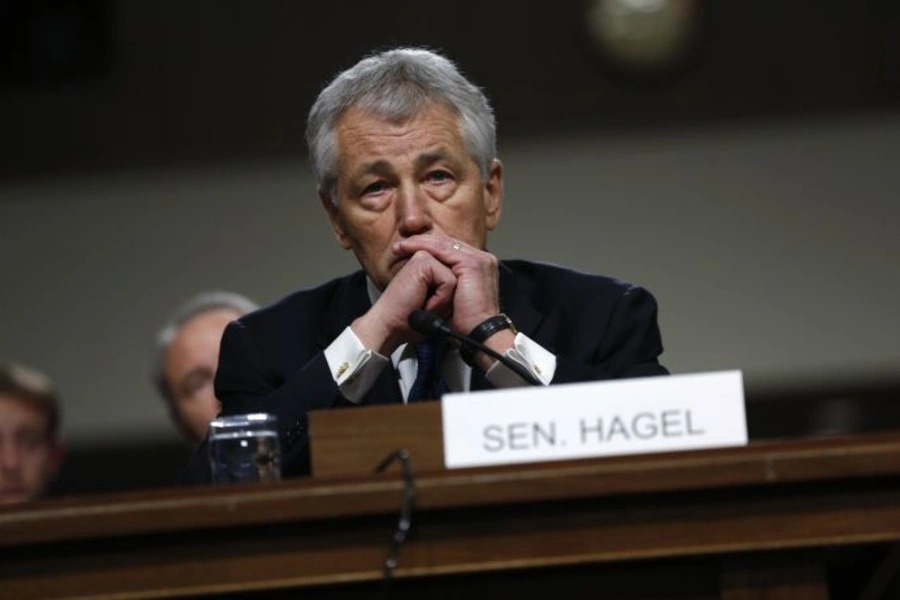Chuck Hagel Hearing and the Iran Nuclear Dilemma

More on:
Senator Chuck Hagel’s confirmation hearing before the Senate Armed Services Committee was a protracted, repetitive, and disappointing affair. Rather than discuss the decisions for which the secretary of defense is empowered by U.S. law to make and implement as the “principal assistant to the President in all matters relating to the Department of Defense,” the hearing focused instead on forcing the former Nebraska senator to defend or deny his previous statements and positions.
Hagel was repeatedly asked to re-clarify his already clarified positions about Israel and Iran. According to a Buzzfeed word count of the hearing, Israel and Iran were mentioned 166 and 144 times, respectively; meanwhile, Afghanistan (where 66,00 U.S. troops are stationed) was referenced 20 times, and troop suicides (which cost more lives in 2012 than battlefield deaths) was mentioned only twice. In comparison, Israel and Iran were mentioned much less frequently in recent secretary of defense confirmation hearings: for Donald Rumsfeld, Israel twice and Iran once; Robert Gates eight and seventy-four; and Leon Panetta three and eight.
It was during one of the many, many exchanges about Iran that Senator Saxby Chambliss asked the essential question of U.S. policy toward Iran:
Talk about redlines. If your position is truly prevention and not containment, Chuck, what is the redline, what is the point? We know there’s some things happening over there right now that are very serious. So how far do we go?
Hagel replied:
You asked the question about redlines. Well, redline. I think the president has gone as far as he should go publicly. He said clearly that, his words, he has Israel’s back. He said that it is policy not to allow the Iranians to get a nuclear weapon. What constitutes when the action would actually be taken. I think that’s always something that should not be discussed publicly, or debated publicly, or out in the public domain…I think the president is wise in his course of action, in not discussing that publically. I think it is a far smarter way to handle it. And I think he has said what he needs to say. I think it’s been understood in Iran. I think the world understands his position.
This is an astonishing observation. The entire objective of diplomatic and economic sanctions, combined with the latent threat of military force, is to compel a state to change its behavior. Compellence, or coercive diplomacy, has three essential ingredients. First, a specific demand is placed upon a target state. Second, a specific deadline or a sense of urgency to comply is communicated to the target. Third, a credible threat of military punishment is made, which is great enough to make the target choose compliance over resistance. In addition, positive incentives can be offered to the target along with the declaration of the threat in an effort to increase the likelihood of compliance—i.e. offering a “carrot” while wielding a “stick.” This strategy succeeds when the target state complies with the demand on the required timeline because of the threat or use of limited force.
President Obama’s redline on Iran is not at all clear or understood by the Iranian regime, U.S. Senate, or anyone else. Since I wrote in December about this summer’s looming deadline hinted by Israel and the United States, I have asked many U.S. government officials and national security analysts what would specifically trigger an attack by Israel and/or the United States against Iran’s suspected nuclear weapons sites. No one knows the answer to this question.
If policymakers or analysts cannot understand President Obama’s redline, then Iran does not either. (Moreover, redlines offered by Israeli officials are also totally inconsistent.) If Iran does not know exactly what is the U.S. and Israeli redline, they do not know what actions would compel an attack. Coercive diplomacy does not work through a Vulcan mind meld.
Later in the marathon hearing, Hagel sensibly observed, “I think it’s always wise to try to talk to people before you get into war.” But apparently it is unwise to tell them how to avoid war in the first place. Moreover, what justification for going to war with Iran would President Obama offer to the American public, if the trigger for initiating such a preemptive war was kept secret?
More on:
 Online Store
Online Store